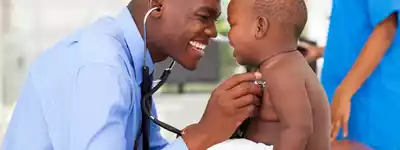
Speech Concerns
2/15/2021
As your child starts speaking, you may have concerns about your child’s speech and language development. You may be concerned about the number of words they have, how they pronounce words, and how they understand language. Speech and language disorders affect approximately 8% of children (10% of black children, 8% of white children, and 6 % of Hispanic children). They are more likely to occur in children 3-6 years of age. The incidence goes down to 5% at kindergarten age. Boys are more likely than girls to have a speech disorder, especially after the age of 3. We also see the incidence of speech delays, particular expressive delays, increase by 50% for every 30 minutes of screen time your child gets daily!
But how do you know if it is a problem or not? Let's explore common speech problems in young children. If you have concerns about your child’s speech, please speak with your primary care provider. Based on your child’s age we can recommend an audiology visit and an evaluation with a speech and language pathologist.
SPEECH DISORDERS
DEVELOPMENTAL EXPRESSIVE SPEECH DELAY
A developmental expressive speech delay is when your child has difficulty remembering or using words. Their receptive language is not affected, and they can correctly produce sounds. There is no known cause, and it is NOT related to intelligence, but there is sometimes a family history of speech delay. This type of delay can also be seen in conjunction with other disorders though such as autism, hearing impairment, and brain injury,
If your child has an expressive speech delay, they may not be able to use or recall words they have learned. They may not have as many words as children in the same age group. They may have shorter sentences than expected for their age or may miss words in a sentence.
RECEPTIVE LANGUAGE DISORDER
Receptive language disorders affect the ability to understand spoken language. This type of delay can be due to a genetic cause, brain injury or a developmental disorder such as autism.
Children with a receptive language disorder will have a hard time understanding language responding appropriately or both. They can have trouble organizing their thoughts to communicate verbally. They may also have trouble with expressive speech since you need to understand language before you can speak the language. It can impact learning in a school-aged child.
If your child has a receptive language delay, they may have a hard time following simple directions, might understand a story but they are unable to describe it. They may have a hard time learning new words and use less precise words when speaking. They may leave out words or use incorrect verb tense. They may be able to pronounce many words but often use limited words or certain phrases more often when speaking.

ARTICULATION DISORDER
Articulation disorders are the most common type of speech delay that we see in children. Articulation disorder is when a child uses a different sound instead of the correct sounds in a word. They have difficulty correctly pronouncing a phonetic sound (sounds of letters or letter blends). Articulations often have no cause but can be seen in children with hearing loss, structural abnormalities of the mouth and jaw including cleft palate or teeth problems, and nervous system conditions.
How do you know your child has an issue with articulation? It can be very hard to tell as we do not expect children to be 100% understandable to a stranger until age 5-6! And children make phonological errors that are developmentally normal. Below are the normal phonological errors children make and when we should expect them to be corrected.

We suspect an articulation disorder when your child is making these errors after the appropriate age. This can be hard to detect since you will understand your child better than everyone else. But after age 3, your child’s speech should mostly be intelligible to family, babysitters, teachers, and other children. If these people in your life struggle to understand your child, an evaluation may be warranted. With concerns remember to speak with your primary care provider but you can also help your child at home by:
• Practicing revision (repeating what your child says or rephrasing what they are saying with the correct pronunciation)
• Avoiding imitating the error
• Read, read, read
• Model through play!
• Let your child feel your face or lips while talking
STUTTERING
Stuttering can be a normal age-related process, this is called typical stuttering. With typical stuttering a child will repeat phrases and whole words. An example of this is your child saying, “I want, I want”. They may also use filler sounds such as ‘um’ or ‘uh’. They generally show no tension or physical struggle unless pressured or ridiculed by the person they are speaking with. The stutter is not accompanied by a tic (unintentional movement or vocalization) or problematic behavior. This is most common in children aged 18 months to 5 years of age. It tends to come and go, is generally more prevalent during a language development burst, and lasts less than 6 months. There often is no family history of a stuttering disorder.
An atypical stutter can start as young as 18 months but most commonly emerges between 3 and 5 years of age. It continues longer than 6 months. There also may be a family history of stuttering. Often the child will repeat sounds or syllables (c-c-c-c-cat) or prolong a sound (mmmmmmmommy). They may look “blocked” like they physically can’t speak. They may also have tics such as blinking, throat clearing, or tapping associated with the stuttering. Children with an atypical stutter can be very frustrated and often have a negative reaction to the stuttering regardless of their parents reaction.
If you suspect your child has an atypical stutter, they need therapy with a speech and language pathologist. If your child has a typical stutter, you can help them by never making your child feel bad about the stutter, never telling the child to slow down or relax, not rushing them to speak, and trying not to finish their sentences. Let your child take the time they need to form their sentence and model your own speech in an unhurried way. Give your child your undivided attention and avoid having multiple people talking at the same time.
APRAXIA
Apraxia is a speech delay caused by a motor disorder. With apraxia, a child’s brain struggles to plan and coordinate the movement of the lips, jaw, or tongue for talking. A child who has apraxia may:
• Distort sounds, especially vowels
• Make multiple, inconsistent speech errors (they say it correctly sometimes but not every time)
• Move their mouth in a strange way trying to make the correct sounds
• Have impaired infection (the emotion in our voice)
• Have receptive language far more advanced than their expressive language skills
Most children with apraxia are diagnosed around age 3 when we see many normal phonological errors correct themselves. Apraxia will never fix itself with time. The best treatment is therapy with a speech and language pathologist.
APHASIA
Aphasia is a communication disorder usually a result of brain injury. The symptoms can be mild or severe based on the severity of damage. Aphasia affects speaking, comprehension, reading, writing, expressive language and receptive language. Symptoms include speaking in short or incomplete sentences, using wrong or nonsense words, or using words in the wrong order. People with aphasia can have a hard time understanding other people’s speech or a hard time following fast-paced speech. They may also not be able to understand figurative speech. There are different types of aphasia that all present differently. Because this is caused by damage to the brain, this must be evaluated and diagnosed by a neurologist and requires speech and language therapy.

AUTISM
Autism itself is not a language disorder but an autistic child may have some language differences or delay. These differences occur on a spectrum. Some children with Autism have advanced speech and language skills and some children are non-verbal. An autism diagnosis requires a developmental specialist who will then recommend appropriate therapy for your child. But what should you watch for in terms of speech and language development?
Before 12 months:
• not responding to their name (this starts around 6 months)
• not smiling
• not enjoying interactions
• not making noises
• not making eye contact
After 12 months:
• doesn’t look in the direction of named objects
• not pointing
• not following basic directions
• loss of words
• echolalia (repeating words but not initiating language)
• pronoun errors
• no use of gestures or decreased use of gestures
• unable to label wants or needs but can label objects
WHAT DO I DO IF I HAVE CONCERNS?
If you have concerns about your child’s speech, please discuss these concerns with your primary care provider. Early therapy can make a big difference not only with your child’s language but in their behavior! Children who struggle to communicate can be very frustrated and can’t express their frustration using words. You may see this come out in their behavior. Your provider will discuss the appropriate place to have your child evaluated based on their age. Children under the age of 3 are eligible for services through the Early Intervention Program. Children over the age of 3 are eligible for services through the school system. There are also private speech and language pathologist in your community, but your health insurance may determine who and how often you can see private therapists. We are here to assist you in making sure your child receives the appropriate therapy if needed.
Children’s Health Care of Newburyport, Massachusetts and Haverhill, Massachusetts is a pediatric healthcare practice providing care for families across the North Shore, Merrimack Valley, southern New Hampshire, and the Seacoast regions. The Children’s Health Care team includes pediatricians and pediatric nurse practitioners who provide comprehensive pediatric health care for children, including newborns, toddlers, school aged children, adolescents, and young adults. Our child-centered and family-focused approach covers preventative and urgent care, immunizations, and specialist referrals. Our services include an on-site pediatric nutritionist, special needs care coordinator, and social workers. We also have walk-in appointments available at all of our locations for acute sick visits. Please visit chcmass.com where you will find information about our pediatric doctors, nurse practitioners, as well as our hours and services.
Disclaimer: this health information is for educational purposes only. You, the reader, assume full responsibility for how you choose to use it.








